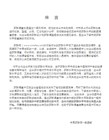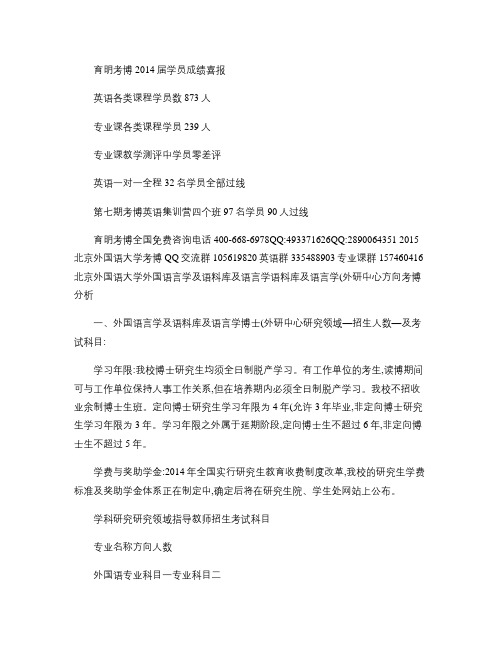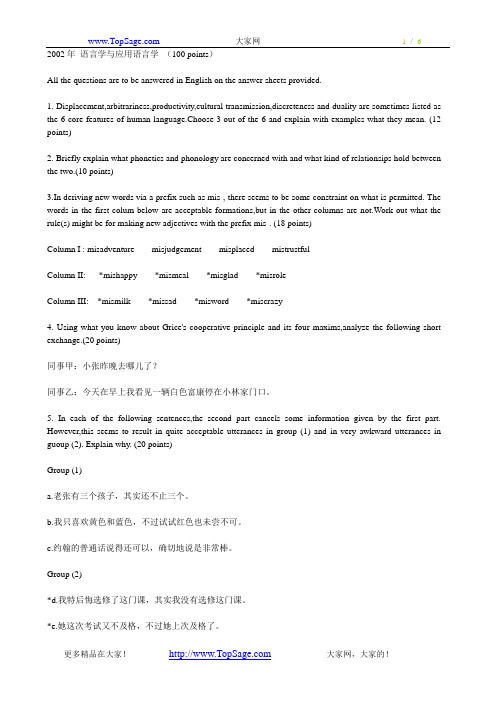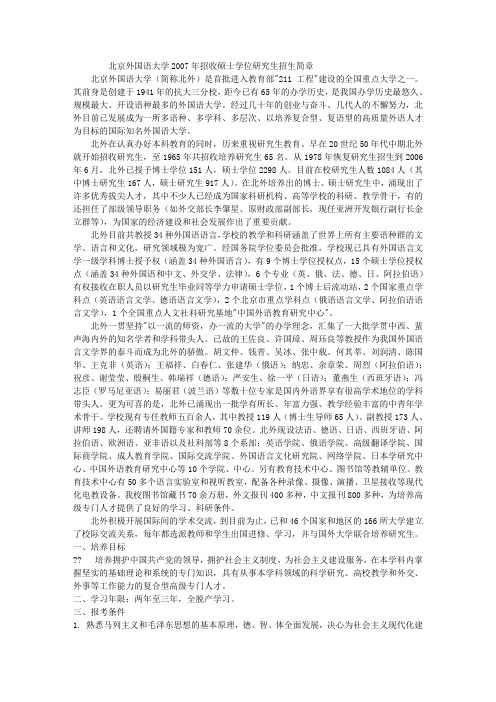北外语言学与应用语言学02-07
北外专业目录及参考书目

2011北京外国语大学中国语言文学学院语言学及应用语言学考研招生目录参考书目初试复试科目050102语言学及应用语言学2009 招生目录(本专业招生 20 人)研究方向(55)对外汉语教学理论(012中国语言文学学院)(56)汉语研究(012中国语言文学学院)(57)汉外语言对比(012中国语言文学学院)初试科目(55)对外汉语教学理论(012中国语言文学学院)考试内容:1、101政治2、201英、202俄、203日、212法、213德选一3、711 语言综合卷(古、现代汉语、语言学概论)4、923对外汉语教学理论(56)汉语研究(012中国语言文学学院)考试内容:1、101政治2、201英语3、711 语言综合卷(古、现代汉语、语言学概论)4、924现代汉语(57)汉外语言对比(012中国语言文学学院)考试内容:1、101政治2、201英语3、711 语言综合卷(古、现代汉语、语言学概论)4、925对比语言学参考书目1、现代汉语《现代汉语》,黄伯荣、廖序东著,高等教育出版社。
《语法讲义》,朱德熙著,商务印书馆。
古代汉语《古代汉语》,王力主编,中华书局。
2、语言学概论《语言学概论》,高名凯、石安石著,中华书局。
《语言学纲要》,叶蜚声、徐通锵著,北京大学出版社。
3、对外汉语教学《对外汉语教学入门》,周小兵、李海鸥主编,中山大学出版社。
《对外汉语教育学引论》,刘珣著,北京语言文化大学出版社。
《对外汉语教学理论研究》,李泉主编,商务印书馆。
4、汉日语言对比《汉日语言对比研究》,张麟声著,北京大学出版社。
《概说现代日语语法》,铃木康之主编,彭广陆编译,吉林教育出版社。
复试备注(55)含自筹6名(56)含自筹3名(57)本届只招汉日对比含自筹1名050102语言学及应用语言学2008 招生目录(本专业招生 31 人)研究方向(50)对外汉语教学理论(51)国际汉语教育(52)汉语研究(53)汉日语言对比初试科目①101政治②201英、202俄、203日、212法、213德选一③712 语言综合卷(古、现代汉语、语言学概论)④911对外汉语教学理论考试科目①101政治②201英、202俄、203日、212法、213德选一③712 语言综合卷(古、现代汉语、语言学概论)④912现代汉语①101政治②201英语③712语言综合卷(古、现代汉语、语言学概论)④912现代汉语①101政治②201英语③712语言综合卷(古、现代汉语、语言学概论)④913对比语言学参考书目语言学及应用语言学(50)—(53)对外汉语教学理论国际汉语教育汉语研究汉日语文对比1、现代汉语《现代汉语》,黄伯荣、廖序东著,高等教育出版社。
北外专业

5
(42)捷克语语言文学
(009欧洲语言文化学院)
李 梅 教 授
徐伟珠 副教授
2
101政治
二外210英语
690捷克语基础
890捷克语专业
(43)意大利语语言文学(003法语系)
王 军 教 授
曹金刚 副教授
2-4
101政治
612语言学基础知识
研究方向(49)(50)考819外语教育
研究方向(51)考820计算机自然语言处理
学制两年 ,学费每年1.25万元
含自筹25-30名
(49)外国语言研究(句法学、语义学、语用学、英语教学语法、英汉词典学、英汉语对比研究、翻译研究) (013中国外语教育研究中心)
611基础英语
817英语新闻业务(含英语新闻写作、编辑和编译)与新闻学基础知识(含中外新闻史与新闻学原理,用中文答)
含自筹
5名
(10)英美文论与文化研究(018外国文学所)
胡文仲 教 授
姜 红 副教授
赵国新 副教授
王 炎 副教授
5
101政治
二外(211俄、212法、213德、214日、215西 选一)
(50)计算机自然语言处理(013中国外语教育研究中心)
(51)翻译理论与实践(英语同声传译)(011高翻学院)
王立弟 教 授
李长栓 副教授
60
101政治
二外(211俄语或212法语或213德语或214日语或215西班牙语,任选一种)
611基础英语
921英汉互译
1、学制两年 ,学费每年2.5万元。
薛庆国 教 授
北京外国语大学外国语言学及应用语言学―语料库语言学(外研中心(精)

育明考博2014届学员成绩喜报英语各类课程学员数873人专业课各类课程学员239人专业课教学测评中学员零差评英语一对一全程32名学员全部过线第七期考博英语集训营四个班97名学员90人过线育明考博全国免费咨询电话400-668-6978QQ:493371626QQ:2890064351 2015北京外国语大学考博QQ交流群105619820英语群335488903专业课群157460416北京外国语大学外国语言学及语料库及语言学语料库及语言学(外研中心方向考博分析一、外国语言学及语料库及语言学博士(外研中心研究领域—招生人数—及考试科目:学习年限:我校博士研究生均须全日制脱产学习。
有工作单位的考生,读博期间可与工作单位保持人事工作关系,但在培养期内必须全日制脱产学习。
我校不招收业余制博士生班。
定向博士研究生学习年限为4年(允许3年毕业,非定向博士研究生学习年限为3年。
学习年限之外属于延期阶段,定向博士生不超过6年,非定向博士生不超过5年。
学费与奖助学金:2014年全国实行研究生教育收费制度改革,我校的研究生学费标准及奖助学金体系正在制定中,确定后将在研究生院、学生处网站上公布。
学科研究研究领域指导教师招生考试科目专业名称方向人数外国语专业科目一专业科目二050211外国语言学及应用语言学语料库语言学(013外研中心语料库语言学王克非1二外英语应用语言学(外研中心语料库研究应用语言学/语料库语言学梁茂成1-2语料库语言学语料库语言学李文中1二、导师介绍:王克非:中共党员。
1976-86年在湖南省地质部门工作,1986年考入北京外国语大学,师从许国璋教授,1989年获硕士学位;后留校工作兼在职博士生,1993年获博士学位;1994年升任副教授,1997年晋升教授。
主要从事语言学和翻译研究。
近年开设"翻译理论"、"翻译与文化"、"英汉比较与翻译"等硕士生课程。
北外 02-07 语言学及应用语言学

2002年语言学与应用语言学(100 points)All the questions are to be answered in English on the answer sheets provided.1. Displacement,arbitrariness,productivity,cultural transmission,discreteness and duality are sometimes listed as the 6 core features of human language.Choose 3 out of the 6 and explain with examples what they mean. (12 points)2. Briefly explain what phonetics and phonology are concerned with and what kind of relationsips hold between the two.(10 points)3.In deriving new words via a prefix such as mis-, there seems to be some constraint on what is permitted. The words in the first colum below are acceptable formations,but in the other columns are not.Work out what the rule(s) might be for making new adjectives with the prefix mis-. (18 points)Column I : misadventure misjudgement misplaced mistrustfulColumn II: *mishappy *mismeal *misglad *misroleColumn III: *mismilk *missad *misword *miscrazy4. Using what you know about Grice's cooperative principle and its four maxims,analyze the following short exchange.(20 points)同事甲:小张昨晚去哪儿了?同事乙:今天在早上我看见一辆白色富康停在小林家门口。
北语语言学与应用语言学参考书目

北语语言学与应用语言学参考书目:教材:(必看)《现代汉语》黄伯荣、廖旭东主编(第四版,第五版都可以)《古代汉语》王力主编《语言学纲要》徐通锵、叶蜚声主编教材是要一遍一遍仔细看的,北语考得很基础,每门专业课有120分左右都是课本上的,不要以为看一两遍就没有可学的了,虽然北语现汉的题比较活,还是考得课本上的基础知识。
重点参考资料:(必看)程娟现汉语音词汇讲义,郑贵友现汉语法讲义(见群共享:专业课重点资料)程娟是现汉语音词汇部分的出题老师,她的讲义要仔细看,尤其是同义词辨析部分;郑贵友老师是以前的出题人,他的讲义清晰细致,很有参考价值,复句部分可以不看课本只看讲义。
《语言学纲要学习指导书》语纲没有讲义,学习指导书很重要。
《现代汉语》北京大学中文系现代汉语教研室编主要看语音部分的课后题,和北语的出题方式类似。
北大版和黄廖版有分歧的地方以黄廖版为主,不必纠结。
其他参考资料:(看熟教材后,根据提示有选择性的阅读)《现代汉语词汇》符淮青不厚的一本小书,有选择性的针对重点看看。
《现代汉语语法研究教程》陆俭明句法分析必考;还有本《汉语和汉语研究十五讲》两本看一本就行,第二本较第一本更详细更复杂。
《汉语语法三百问》邢福义可做课本知识补充,做真题时可以拓宽思路,选择性看。
《王力语同步与辅导练习》中华书局出版王力本对应的课本解释和练习题,可与古汉课本配套同步复习。
《古代汉语辅导及习题集》崇文书局出版有文选翻译,可与古汉课本配套同步复习。
《古代汉语教程》复旦大学出版通论部分很详细。
《语言学纲要辅导及习题集》崇文书局里面有一些学校的真题,可参考看看。
《普通语言学教程》索绪尔要了解一点。
《语言学概论》(第二版)岑云强与叶本相补充。
《语言学常识十五讲》沈阳与叶本相补充。
北京第二外国语学院外国语言学及应用语言学考研参考书笔记

叶蜚声、徐通锵:《语言学纲要》,北京:北京大学出版社,1997 年版。
袁行霈主编:《中国文学史》,北京:高等教育出版社,2005 年版。 童庆炳主编:《文学概论》,北京:高等教育出版社,1998 年版。 黄伯荣:《现代汉语》,北京:高等教育出版社,1991 年版。 郭锡良:《古代汉语》北京:商务印书馆,2004 年版。
复试参考书:
更多资料下载:
无指定参考书,但要关注时事(中英文)。
才思教育考研考博全心全意
注:该专业统考科目不含第二外语,但复试过程中将有第二外语口语和听力测试,考试形式 为对话问答。我校二外语测试的科目为二外日语、二外法语、二外德语、二外俄语和二外西 班牙语,考生可任选一门参加考试,入学后考生按照选定的二外语科目参加二外语学习。
【翻译】(考试题型:韩译中,中译韩)
【韩国文学】(考试题型:选择题,简答题,分析题 )
【韩国文化】( 考试题型:填空题,选择题,简答题, 分析题 )
1.《韩中翻译教程》、《中韩翻译教程》,张敏 等编著,北京大学出版社,
2005 年。
2.《韩国现代文学作品选》(韩文),尹允镇 等编著,上海交通大学出版
818 综合考试(阿):
1. 《阿拉伯语与阿拉伯文化》周烈,外语教学与研究出版社,1998 年。
2. 《阿拉伯通史》纳忠,商务印书馆,1997 年。
3. 《阿拉伯伊斯兰文化史纲》,孙承熙,昆仑出版社,2001 年。
4. 《阿拉伯文学通史》,仲跻昆,译林出版社,2010 年。
《阿拉伯文学选集》齐明敏、薛庆国、张洪仪、陈冬云,外语教学与研究出版社,2004 年。
北京外国语大学2007年招收硕士学位研究生招生简章

北京外国语大学2007年招收硕士学位研究生招生简章北京外国语大学(简称北外)是首批进入教育部"211工程"建设的全国重点大学之一。
其前身是创建于1941年的抗大三分校,距今已有65年的办学历史,是我国办学历史最悠久、规模最大、开设语种最多的外国语大学。
经过几十年的创业与奋斗、几代人的不懈努力,北外目前已发展成为一所多语种、多学科、多层次、以培养复合型、复语型的高质量外语人才为目标的国际知名外国语大学。
北外在认真办好本科教育的同时,历来重视研究生教育。
早在20世纪50年代中期北外就开始招收研究生,至1965年共招收培养研究生65名。
从1978年恢复研究生招生到2006年6月,北外已授予博士学位151人,硕士学位2298人。
目前在校研究生人数1084人(其中博士研究生167人,硕士研究生917人)。
在北外培养出的博士、硕士研究生中,涌现出了许多优秀拔尖人才,其中不少人已经成为国家科研机构、高等学校的科研、教学骨干,有的还担任了部级领导职务(如外交部长李肇星、原财政部副部长,现任亚洲开发银行副行长金立群等),为国家的经济建设和社会发展作出了重要贡献。
北外目前共教授34种外国语语言,学校的教学和科研涵盖了世界上所有主要语种群的文学、语言和文化,研究领域极为宽广。
经国务院学位委员会批准,学校现已具有外国语言文学一级学科博士授予权(涵盖34种外国语言),有9个博士学位授权点,15个硕士学位授权点(涵盖34种外国语和中文、外交学、法律),6个专业(英、俄、法、德、日、阿拉伯语)有权接收在职人员以研究生毕业同等学力申请硕士学位,1个博士后流动站,2个国家重点学科点(英语语言文学、德语语言文学),2个北京市重点学科点(俄语语言文学、阿拉伯语语言文学),1个全国重点人文社科研究基地"中国外语教育研究中心"。
北外一贯坚持"以一流的师资,办一流的大学"的办学理念,汇集了一大批学贯中西、蜚声海内外的知名学者和学科带头人。
2021北京大学外国语言学及应用语言学考研真题经验参考书

去年这个时候,我正四处搜寻北大外应考研的经验贴,每看见一篇都会立马截图保存下来。
这些经验贴的截图可以说是一直伴随到我考研结束,因为在初始阶段,大家看考研经验可能压根都不看不懂学姐在说什么,所以每次遇到瓶颈时我都会拿出来看一下,对这些分享经验的学姐真的是心存感激的。
现在我也顺利地考上了研究生,在这个毕业前的空档,也想给大家分享一下过去一年的备考情况,希望对正在考这个方向研究生的同学有所帮助,也算是给自己过去一年的努力留个印记吧。
首先来给大家讲一下大家对这四个科目应该如何把握吧,即考察的要点和题型大概是怎样的。
政治:选择题+问答题。
前期,即开始看政治到11月初,只用做选择题,重点在于理解,后期,即肖爷爷的肖八(试卷的名字,因为有八套,又是肖爷爷出的,所以简称肖八,是押题卷)出来后,大约在11月初,开始背问答题,是的,重点在于背诵,当然这时还不能完全放弃做选择题。
我是全程跟着肖爷爷走的,买的都是他的书,没有看网课或者报辅导班。
八月中下旬到十月底把精讲精练看第一遍,同时是每看完一章就做一章的练习题,十一月份开始把重点章节的选择题再做一遍。
做选择题时,每做错一次,就回到书上把对应的知识点再看一遍。
后来十一月中旬还买了肖爷爷的精讲精练的精炼版,我把这本书也看了一遍,不是很厚,大家也可以考虑风中劲草,听说也挺好的,但我喜欢一套一套的,所以也没有背叛肖爷爷。
问答题就背肖四肖八,就算肖八没背熟,那肖四就是你的底线了,一定要背。
法语:参考书是新大学法语,共三册,三本书。
考试题型有第一题:动词变位;第二题:介词搭配,代词填空;第三题:一篇完形填空;第四题:两篇阅读理解;第五题:两篇翻译,汉译法,法译汉,大概就是这样。
所以大家应该掌握动词变位,代词和介词的语法点,固定搭配以应付完形填空,课本上的单词必须多过几遍,以应对阅读和翻译,课本上的课文也应该看,因为翻译有时候会与课文内容相关。
英语综合知识:一上来就是九篇阅读,不要被吓到,题量摆在这里,难度相对于专八阅读来说还是不大的,除八篇常规阅读外还有一篇七选五,一篇20空的完形填空,一篇改错,还有各种考察单词的题型,如选择题,根据所给单词用适当形式填空的题。
- 1、下载文档前请自行甄别文档内容的完整性,平台不提供额外的编辑、内容补充、找答案等附加服务。
- 2、"仅部分预览"的文档,不可在线预览部分如存在完整性等问题,可反馈申请退款(可完整预览的文档不适用该条件!)。
- 3、如文档侵犯您的权益,请联系客服反馈,我们会尽快为您处理(人工客服工作时间:9:00-18:30)。
2002年语言学与应用语言学(100 points)All the questions are to be answered in English on the answer sheets provided.1. Displacement,arbitrariness,productivity,cultural transmission,discreteness and duality are sometimes listed as the 6 core features of human language.Choose 3 out of the 6 and explain with examples what they mean. (12 points)2. Briefly explain what phonetics and phonology are concerned with and what kind of relationsips hold between the two.(10 points)3.In deriving new words via a prefix such as mis-, there seems to be some constraint on what is permitted. The words in the first colum below are acceptable formations,but in the other columns are not.Work out what the rule(s) might be for making new adjectives with the prefix mis-. (18 points)Column I : misadventure misjudgement misplaced mistrustfulColumn II: *mishappy *mismeal *misglad *misroleColumn III: *mismilk *missad *misword *miscrazy4. Using what you know about Grice's cooperative principle and its four maxims,analyze the following short exchange.(20 points)同事甲:小张昨晚去哪儿了?同事乙:今天在早上我看见一辆白色富康停在小林家门口。
5. In each of the following sentences,the second part cancels some information given by the first part. However,this seems to result in quite acceptable utterances in group (1) and in very awkward utterances in guoup (2). Explain why. (20 points)Group (1)a.老张有三个孩子,其实还不止三个。
b.我只喜欢黄色和蓝色,不过试试红色也未尝不可。
c.约翰的普通话说得还可以,确切地说是非常棒。
Group (2)*d.我特后悔选修了这门课,其实我没有选修这门课。
*e.她这次考试又不及格,不过她上次及格了。
*f.我在乡下日子过得很苦,说真的我没在向下呆过。
6. Put yourself into the position of an English teacher in China. What are your goals and the goals of the students and the educational sysem in the teaching and learning of English? When the goeals do not converge,how can you reconcile the differences between them?(20 points)2003 年语言学与应用语言学All the questions are to be answered in English on the answer sheets provided.1.Words in our mental lexicon are known to be related to one another. Discuss the relationships between words,using examples from the English language.(15 points)2.Some grammar books say there are three basic tenses in English-the present,the past and the future; others say there are only two basic tenses,-the present and the past. Explain what tense is and whether it is justifiable to say there is a future tense in English.(35 points)3.(1) Give an account of what you know about the English subjuntive mood.(20 points)(2) If you are to teach a group of senior middle school students the subjunctive mood in 45 minutes,how are you going to plain your class?(20 points)4. It has been observed that women tend to approximate more closely to the standard language than men do.Why do you think is this so?(30 points)5.What do you think are teh similarities and dissimilarities between learning a first and a second language?(30 points)2004年语言学与应用语言学IMPORTANT!!!All the questions are to be answered in English on the answer sheets provided.1. Shakespeare has Juliet say:What is in a name?That which we call a roseBy any other name would smell as sweet.What do you think the above lines say to you about the relationship between the form (sounds) and meaning (concept) of a word in spoken language?Explain with positive evidence as well as exceptions from the English language. (15 points)2.How much does our language influence the way we think? How deeply do language and culture interpenetrate and influence one another?These questions about language have fascinated thinkers throughout the ages.For example,Johann Gottfried Herder and Wilhelm von Humboldt in the German Romantic tradition regarded language as a prisma or grid spread over things in the world so that each language reflects a different worldview. Write a short essay to explain your position on this view. (35 points)3.Is English a language that uses a phonetic alphabet system? Explain briefly why or why not with examples. (15 points)4.Suppose you were given four cards,each of which had a different phoneme of English printed on it:/k/, /b/, /l/, /i/Now arrange these cards to form all "possible" words that these four phonemes could form. Discuss what rules you have followed to come up with these words. (20 points)5.Paraphrase each of the following sentences in two different ways to show that you understand the ambiguity involved: (10 points)a. Dick finally decided on the boat.b. The professor's appointment was shocking.c. The governor is a dirty street fighter.d. Terry loves his wife and so do I.e. No smoking section available.6.It is argued that grammatically judgments do not depend on whether the sentence is meaningful or not,as shown by the sentence "Colorless green ideas sleep furiously",which doesn't make much sense but is syntactically well formed. How would you respond to this argument? (25 points)7.TOEFL often requires the examinees to specify the situational context after listening to aconversation.See for example a tape-script below for an exam item:V oice A (male): How much is this tie?V oice B (female): Forty.V oice C (male): Where does this conversation most probably take place?What do you think is the TOEFL people's belief about what constitutes linguistic competence and how linguistic competence can be tested? (30 points)2005年语言学与应用语言学All the questions are to be answered in English on the answer sheets provided.1.Examine the following two statements about language,and discuss the similarities and differences between them.Do you agree with the two statements?Explain your answer.(25 points)1) Sapir (1921: "Language"): "Language is a purely human and non-instinctive method of communicating ideas,emotions and desires by means of voluntarily produced symbols" (p.8)2) Bloch and Trager (1942: "Outline of Linguistic Analysis"): "A language is a system of arbitrary vocal symbols by means of which a social group co-operates" (p.5)2. What are phonemes,phones and allophones?Explain their relationship with examples from English or Chinese. (15 points)3. Is it possible to seperate semantics and pragmatics?Why or why not? What are the implications of your answer for second language teaching? (30 points)4.It has been noticed that Chinese learners of English tend to make mistakes in the marking of past tense,even at the advanced level of proficiency. What do you think are the possible causes of this problem?How can language teachers help solve this problem and why? (30 points)5. Look at the following real newspaper headlines and explain why they are considered ambiguous. Then revise the headlines so that they can express the intended meanings unambiguously. (20 points)(1) Complaints about NBA Referees Growing Ugly(2) Milk Drinkers Are Turning to Powder(3) Two Sisters Reunited After 18 Years at Checkout Counter(4) Enraged Cow Injures Farmer with Ax(5) Safety Experts Say School Bus Passengers Should Be Belted6. In interpreting utterances such as (1) and (2), the hearer generally treats the events described in the two sentences in each group as causally related even though such relationship is not encoded in the meanings of the sentences. That is,the hearer tends to think htat Helen fell on the ground BECAUSE OF Tom's pushing and that the vase broke BECAUSE it was dropped.Explain why.(30 points)(1) Tom pushed Helen. Helen fell on the ground.(2) Peter dropped the vase. It broke.2006年语言学与应用语言学All the questions are to be answered in English on the answer sheets provided.1,why do you think that, all other things being equal, women use more standard variants of stable sociolinguistic variables than men? (20 points)2,look at the sentence: …colorless green ideas sleep furiously‟. Explain why the sentence is semantically odd even though it is syntactically well formed. (25 points)3,what, in your view, makes a text, rather than a series of unconnected utterances? What are the implications of your answer for second language teaching? (30 points)4,It has been noted that first language (L1) acquisition is completely successful, but second language (L2) learning is usually not. As Towell & Hawkins(1994:p.14) observe, …v ery fewlearners appear to be fully successful in the way that native speakers are‟. How do you account for this difference in ultimate attainment between L1 and L2 acquisition. (25 points)5,analyse the following speech errors, by commenting on how they might have arisen:(20 points) a, he rode his bike to school tomorrow. (ß yesterday )b, gone mild (ß wild/ mad)c, he misfumbled the ball.(ß mishandled/ fumbled)d, that‟s torrible. (ß terrible /horrible)6,research has found that two-year-old English children produce negative sentences such as a) to d), but not e):a) he doesn‟t like cabbage.b) Doesn‟t like cabbage.c) Him no like cabbage.d) No like cabbage.e) * him doesn‟t like cabbage.How can you account for this? (30 points)语言学和应用语言学07试卷All the questions are to be answered in English on the answer sheets provided1. Imagine you were at a bus stop and two people approached you one after the other. The first said “哎,几点了?”and the other said “不好意思,打扰一下,请问您戴表了么?”What assumptions would you make if you were addressed in these two ways and why would you make them?2. Explain this statement and give at least two examples of it“In studying other cultures, we do so from the perspective of our own culture.”3. 1)Give an account of what you know about the English present perfect tense.2) If you are to teach a group of junior middle school students the present perfect tense in 45 minutes, how are you going to plan your class?4.A teacher drilled his /her students in the structure called indirect questions:Do you know where my book is?Do you know what time it is?Did he tell you what time it is?As a direct result of the drills, all the students were able to produce the structure correctly in class. After class, a student came up to the teacher and asked, “Do you know where is Mrs. Smith?”, which shows that only minutes after the class the student used the structure incorrectly in spontaneous speech. What do you think is the reason for this misuse? Ws the lesson a waste of time? Why or why not?4. 1) What do you think are the differences between a good language learner and a poor language learner?2) If we know what strategies good language learners use, does it follow that teaching so-called poor language learners to use those strategies will result in their successful language learning? Why or why not?。
